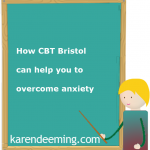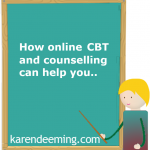In response to Coronavirus (Covid-19), I am offering telephone, online counselling and CBT sessions via Zoom and WhatsApp.
CBT Bristol to help you overcome anxiety
Most of my clients over the past years have reported difficulties with anxiety, so I thought it might be helpful to share a few Cognitive Behavioural Therapy (CBT) tips:
So what is Anxiety?
Anxiety is a normal, but often, a disagreeable part of life. It can affect us all in various ways and at different times in our lives.
We will all feel anxious at some point and it is very common to feel tense and unsure about a potentially stressful situation, such as, going for an interview, taking an exam or trying something new. However, for some of us, these feelings are very strong and lasting, which can lead to feeling overwhelmed. It is at this point, anxiousness becomes anxiety.
Anxiety is what we feel when we are tense, worried or afraid, often about things that are about to happen or are to happen in the future.
And often about things that we cannot control. Anxiety can make you imagine things are worse than they are and prevent you from carrying out everyday tasks.
There are no clear-cut reasons as to what causes anxiety and why it is worse for some people than others.
There are identifiable factors such as childhood trauma, a divorce, a death, that can be attributed to the onset of a person’s anxiety however, for others there is no obvious identifiable cause, and this can add to the distress and uncertainty that you may be feeling.
CBT Bristol research findings about anxiety symptoms:
Anxiety can affect us through our thought processes, through our feelings and through physical sensations.
We can experience many different ‘signs and symptoms’ of anxiety, but not everybody’s anxiety looks the same.
You may experience or have experienced some of the following:
- palpitations
- difficulty in controlling your breathing
- a need for constant reassurance
- feeling tense
- fearing the worst (ie catastrophising)
- constant worry
- self-doubt
- replaying situations in your head over and over and irrational thoughts
Or maybe something different.
So how can CBT Bristol help you to overcome anxiety?
The good news is that anxiety can be managed and reduced. It does not need to control your life. With support you can regain the control. Most importantly, anxiety must not define you as a person.
CBT – focuses on how your thoughts, attitudes and beliefs affect your feelings and behaviour and teaches you coping skills to deal with anxiety.
See more about CBT and CBT Bristol here:
CBT Bristol Tips for anxiety:
Step One
When you experience a negative thought, feeling or physical sensation, breathe, pause, step back then ask yourself the following question:
“what do I know?”
“I know that if I allow my negative thoughts to take over it is not healthy for me and leaves me feeling anxious, I also know that though I can’t stop my thoughts, feelings or physical sensations, I can change what happens next, such as, consciously deciding to stop myself from catastrophising or getting too attached to my thoughts.”
“I know that if I say to myself there goes anger, sadness, disappointment, shyness, self consciousness etc rather than saying I am angry, I am sad, I am feeling self conscious, I am disappointed it is more beneficial for my mental and physical health and well being”.
“I know that if I people please or sacrifice my needs to meet other peoples’ needs I will feel more anxious and it more beneficial for my health and well being to not get too attached these thoughts and instead pause step back and imagine that the thoughts are in a bubble floating in the sky, me walking in the woods /beach or that they are passing clouds in the sky . ”
“I know that thoughts aren’t facts”
What’s also important is that I challenge my thoughts, worries, stresses and anxieties by asking myself the question:
What is the evidence/concrete facts to support the believe that I will fail my driving test?”
and: what evidence/concrete facts are there against it?
CBT Bristol tips for anxiety
Step Two
If you struggle with anxiety, you are highly likely to have a very loud “inner critic.”
Most of you may already know, however for those of you who are unfamiliar, the inner critic often heightens anxiety, as it is your inner voice or negative chatterbox that often goes something like this:
- What’s wrong with me?
- I wish I was as confident as my friends
- Why can’t I get over this and get a grip?
- It’s ridiculous feeling so overwhelmed by such a minor event in my life
- Other people have much bigger problems than me so why am I feeling so low?
- Why can’t I perform as well as my boss and colleagues at work?
- I’m a failure in relationships
- I’m a loser, lazy and selfish blah blah blah…..
Sound familiar? Well you’re not alone in this universal catch-22.
We all have an inner critic, but not all of us let it run riot.
This relentless, negative self talk often expresses criticism, frustration or disapproval about our actions and its frequency, volume or intensity is very different for each us.
CBT Bristol has summarised below, how the inner critic might cause anxiety:
Inner critic dialogue is anxiety-provoking and shaming and so paralyses your sense of motivation and get up and go. It can result in unhealthy behaviours such as avoidance and procrastination, in order to reduce anxiety and stay safe when it is largely not necessary to do so.
In other words, because you are frightened or anxious about a particular situation, you adopt self protection mechanisms and put on your breaks too soon, often depriving yourself of adventure, enjoyment, pleasure and spontaneity.
So anxiety can be very unhealthy for you if you struggle to develop coping mechanisms
It may seem a mammoth task and a huge mountain to climb right now, however, here’s how to turn down the volume of your inner critic and, as I like to call it, my inner DJ’s sound system:
CBT Bristol tips to prevent the inner critic and anxiety taking over:
Awareness is the first step to recognising and letting go of your inner critic. Many of you won’t have even realised its presence until now.
Acknowledge and make friends with your inner critic instead of continually arguing and battling with it.
Using the more playful side of your character and sense of humour, invent a nickname like I did such as DJ, Zippy, Chimp or Top Dog.
If you notice your inner critic or anxiety taking over:
Imagine it is a record turn table so that you can turn the volume down or that it’s a tape, play or film that you can rewind. Slow down. Close your eyes. Take a deep breath and gently say no.
It may help to visualize a strong and wise part of yourself gently removing your critic from its stage or soapbox.
Over to you:
If after reading this blog you are still struggling to tame your inner critic, DJ or Zippy and are feeling overwhelmed with distractions and negative thoughts don’t panic or give up just yet.
CBT Bristol anxiety sessions can help you.
So, if you need a bit of extra support and encouragement and a few on line, telephone or face to face CBT sessions why not contact Karen Deeming to arrange an appointment or for a short free introductory chat on 07950 751352 or send an email to: karen@karendeeming.com
CBT Bristol for anxiety other treatment recommendations:
As well as CBT, there are other options available to support you with managing your anxiety:
Counselling – a talking therapy. Can bring clarity, peace of mind and the answers to the problems that you are struggling with.
See more about Counselling here:
Mindfulness – enhances mental and physical wellbeing. Provides exercises and Meditation techniques to enable you to recognise triggers and reduce anxiety.
See more about Mindfulness here:
Medication: There are medications available that can help manage some symptoms of anxiety. You will need to speak with your Doctor for further advice around this.
References:
www.mind.org.uk
www.anxietyuk.org.uk
www.counselling-directory.org.uk
Bourne, Edmund J (2015) Anxiety and Phobia Workbook, 6th Edition. California: New Harbinger
You can book your appointment here or you can contact me on (044) +7950 751352 for outside the UK or 07950 751352 inside the UK. Alternatively by email: karen@karendeeming.com.


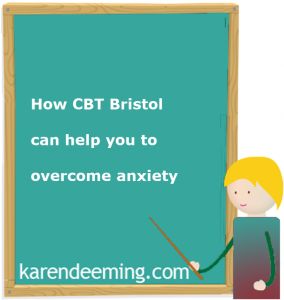

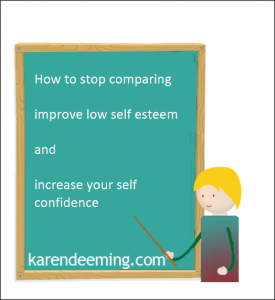
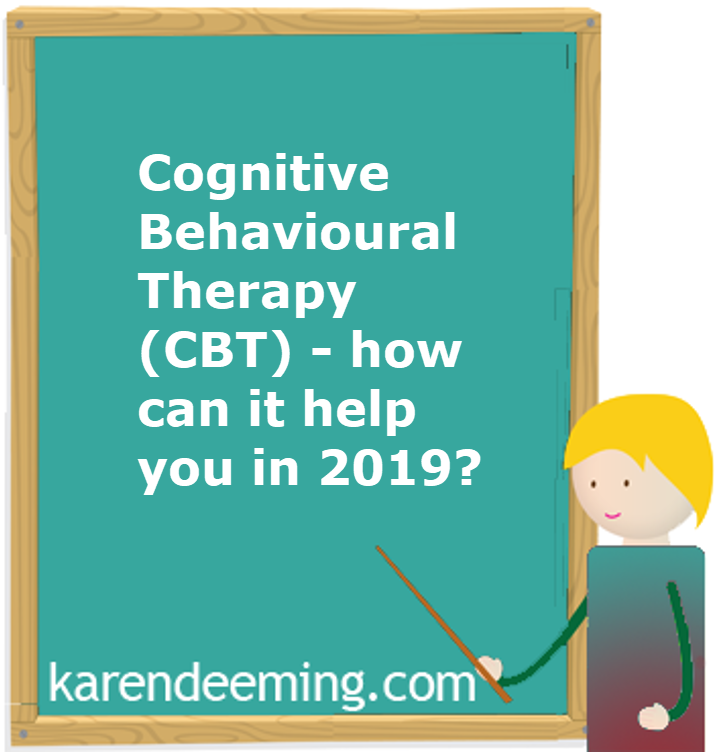
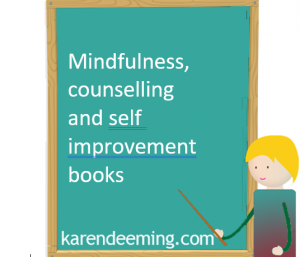



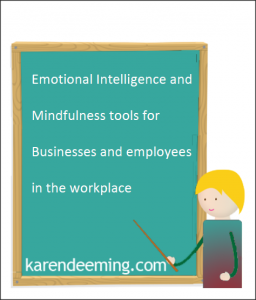
![Karen_Deeminga[1]](http://www.karendeeming.com/wp-content/uploads/2015/09/being-practice-self-portrait-e1541437891746.jpg) Welcome to my site. if you have any queries then please
Welcome to my site. if you have any queries then please
